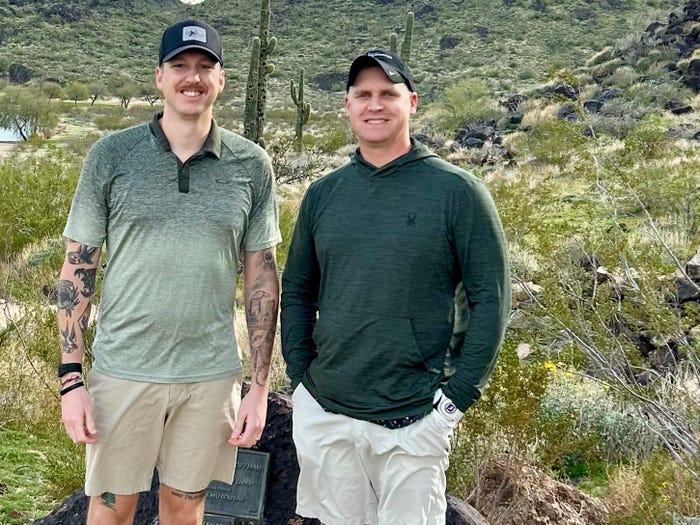Mike Gorius and Kevin Hart are making waves in the real estate market in Louisville, Kentucky.
Courtesy of Kevin Hart and Mike Gorius
As of March, mortgage rates are sitting around 6.4%, but these two investors are looking to pay nearly double that to partner with private money lenders. Their primary motivation? Speed and efficiency.
Gorius shared with Business Insider that collaborating with private money lenders entails “a lot less paperwork and far fewer hoops to jump through” compared to traditional lenders. Gorius and Hart transitioned from their W-2 jobs to full-time real estate investing, focusing on wholesales, wholetails, and flips mainly in Louisville, KY. They manage over 20 rental properties, including various types of rentals, which BI confirmed through settlement statements and closing documents.
Gorius outlined three main avenues for borrowing funds in the real estate sector: private money lenders, hard money lenders, and traditional lenders. While traditional lenders usually offer lower interest rates, hard money lenders can be considerably pricier.
“Currently, the rates we’re observing for private money lenders range between 10% and 12%,” Gorius reported. “Hard money lenders typically charge between 11% and 13%, often slightly higher because they have operational costs — staff and office space. Meanwhile, Fannie Mae and Freddie Mac show interest rates between 6% and 7%.”
One of the key benefits of working with private money lenders is the ability for quick deal closures. Gorius and Hart are consistently closing deals on a weekly basis.
“We handle our own inspections since Kevin has extensive experience, and because we’re transacting with off-market sellers who are flexible on price, we don’t require an appraisal,” Gorius explained. “This allows us to act much quicker, enabling us to purchase properties within days rather than weeks.” Gorius recalled a time they closed a deal in just eight days, a stark contrast to traditional lenders who may take at least 30 days amid extensive paperwork.
The duo officially formed a business partnership under the Joe Homebuyer franchise in 2024.
When finalizing deals, varying parties come together virtually: “At our closing table, we have the seller, the title attorney, us, and essentially the bank, which can be a regular person with capital,” Gorius elaborated.
He illustrated a typical deal in Louisville: a flip costing approximately $150,000 — $100,000 allocated to the property and $50,000 reserved for renovations.
The private lender, akin to a bank, will place $150,000 into escrow. “Out of that, $100,000 goes directly to the seller’s pocket, and we become the new owners. The deed is in either our names or the company’s name,” Gorius said. “The additional $50,000 is released to us at closing, allowing us to fund the rehab of the property.”
Terms can vary based on the lender’s comfort. “Some opt for interest-only monthly repayments to ensure we have some stake in the deal, while others prefer to have all interest settled at the end,” Gorius explained.
Once Gorius and Hart complete renovations and are ready to sell, the new buyer deposits the sale price into escrow. The title attorney ensures that the private money lender is repaid their initial $150,000, plus any agreed-upon interest, while Gorius and Hart take home the profit.
Finding Private Money Lenders
Identifying potential private money lenders often entails networking and reaching out directly. Initially, Gorius tapped into a network of 900 contacts in his phone, messaging each one.
“I simply texted them saying, ‘Hey, I know we spoke recently or it’s been a while, but I’m now investing in real estate. If you’re interested in learning more or have any questions, don’t hesitate to connect,’” he shared. This became a numbers game: “Out of those 900 contacts, maybe nine folks responded positively or expressed interest in the next step.”
He also highlighted the importance of showcasing what you can offer potential investors. In this scenario, it’s an opportunity for them to invest in real estate and earn a better return than keeping their money in traditional bank accounts.
Another effective method Gorius uses is leveraging social media and platforms like LinkedIn. He recounted how detailing his first flip, where he invested $18,000 of his own funds and doubled it within ten weeks, led to significant interest. “I crafted a post that emphasized how if I’d used another person’s $18,000, they could have seen solid returns in just ten weeks as well,” he explained. “This one LinkedIn post helped me raise $280,000.”










